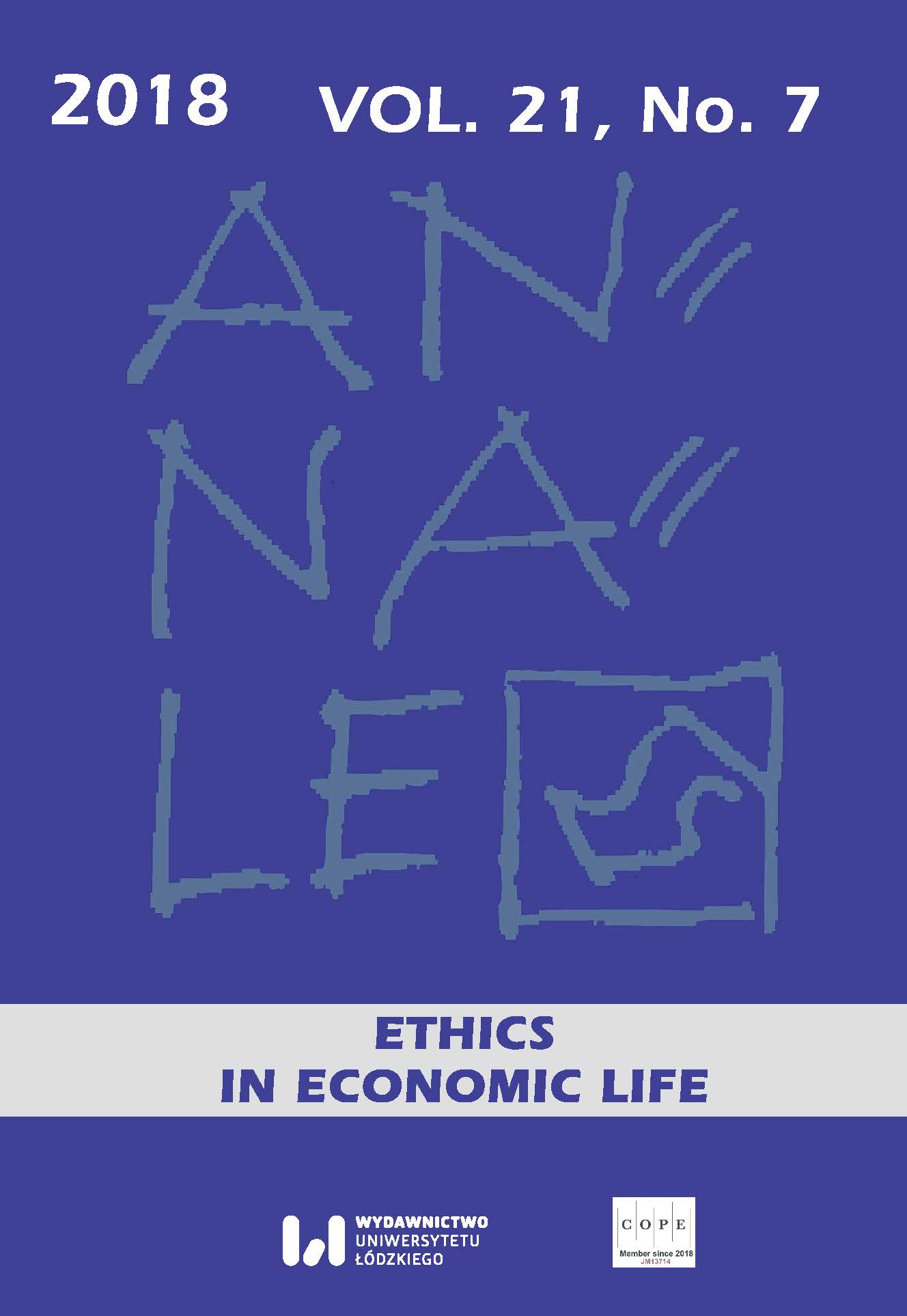Corporate social responsibility in FC Barcelona as Carroll’s CSR pyramid in practice
DOI:
https://doi.org/10.18778/1899-2226.21.7.11Słowa kluczowe:
corporate social responsibility, FC Barcelona, Carroll’s CSR pyramidAbstrakt
Corporate social responsibility (CSR) is a subject of great interest to both theoreticians and practitioners of management as well as to international organisations that promote this idea among existing enterprises. Despite many years of research on CSR, there is no single binding definition of this concept, therefore for the needs of this publication, the definition of Archie B. Carroll, and the resulting approach to CSR implementation in companies, has been adopted. The aim of the article is to analyse CSR activities undertaken by FC Barcelona in the framework of a system derived from Carroll’s CSR pyramid, therefore its activities have been divided into four groups corresponding to the dimension of financial, legal, ethical and philanthropic responsibilities. Due to the commercialisation of football, FC Barcelona is treated as a global enterprise, considering, however, the specificity of regulations governing the sports sector as well as goods and services offered by the club. The research has been based on an analysis of literature and available documents published by the club itself as well as by international organisations regulating football tournaments on national and international levels. The study has indicated that FC Barcelona is taking action in all the dimensions of social responsibility highlighted in Carroll’s pyramid and can be seen as a socially responsible organisation, at the same time meeting expectations of its stakeholders.
Bibliografia
Antonowicz, D., Kossakowski, R., & Szlendak, T. (2015). Aborygeni i konsumenci. O kibicowskiej wspólnocie, komercjalizacji futbolu i stadionowym apartheidzie. Warsaw: Wydawnictwo Instytutu Filozofii i Socjologii Polskiej Akademii Nauk.
Google Scholar
Boedker, B. (2016). The legendary ten. From humble beginnings to big business. Pennsauken: BookBaby.
Google Scholar
Carroll, A. B. (1979). A three-dimensional conceptual model of corporate social performance. Academy of Management Review, 4(4), 497–505.
Google Scholar
Carroll, A. B. (1991). The pyramid of corporate social responsibility: Toward the moral management of organisational stakeholders. Business Horizon, 34(4), 39–48.
Google Scholar
Carroll, A. B. (1999). Corporate social responsibility. Evolution of a definitional construct. Business and Society, 38(3), 268–295.
Google Scholar
Carroll, A. B. (2016). Carroll’s pyramid of CSR: taking another look. International Journal of Corporate Social Responsibility, 1(3).
Google Scholar
European Commission. (2011, October 25). Communication from the Commission to the European Parliament, the Council, the European Economic and Social Committee and the Committee of the Regions. A renewed EU strategy 2011–14 for Corporate Social Responsibility. Brussels.
Google Scholar
FC Barcelona. (2013, October 5). Statutes 5.10.2013. https://www.fcbarcelona.com/docu ments/20197/22189896/02755-Llibret-ReformaEstatuts-ENG-Web-OK.v1418985814.pdf/0cd42db0-f4d7-4465-81ba-e1fccfada8b1
Google Scholar
FC Barcelona. (2016). FC Barcelona and FC Barcelona Foundation Code of Ethics and Conduct. https://pro-cdn-public-fcb.everincloud.com/20157/43501761/656469/1.0/656469.pdf?t=1490701026000
Google Scholar
FC Barcelona Foundation. (2016). Report 2015/2016.
Google Scholar
FC Barcelona. (2017). Report 2016/2017.
Google Scholar
Filizöz, B., & Fisneb, M. (2011). Corporate social responsibility: A study of striking corporate social responsibility practices in sport management. Procedia Social and Behavioral Sciences, 24, 1405–1417. doi:10.1016/j.sbspro.2011.09.062
Google Scholar
Hamidu, A. A., Haron, H., & Amran, A. (2015). Corporate social responsibility: A review on definitions, core characteristics and theoretical perspectives. Mediterranean Journal of Social Sciences, 6(4), 83–95. doi:10.5901/mjss. 2015.v6n4p83
Google Scholar
Hamil, S., Walters, G., & Watson, L. (2011). The model of governance at FC Barcelona: balancing member democracy, commercial strategy, corporate social responsibility and sport performance. In D. Hassan, & S. Hamil (Eds.), Who owns football?: Models of football governance and management of the club game worldwide (pp. 133–162). New York: Routledge.
Google Scholar
Haynes, K., Murray, A., & Dillard, J. (2013). Corporate social responsibility: A research handbook. New York: Routledge.
Google Scholar
Jastrzębska, E. (2015). Środowisko przyrodnicze jako niemy interesariusz społecznie odpowiedzialnego przedsiębiorstwa. Dobre praktyki biznesu w Polsce. Logistyka Odzysku, 2(15), 49–51.
Google Scholar
Jutterström, M., & Norber, P. (2013). CSR as a management idea. In M. Jutterström, & P. Norber (Eds.), CSR as a management idea. Ethics in action. Cheltenham: Edward Elgar Publishing.
Google Scholar
Komorowski, J. (2011). Cele i wartości współczesnego przedsiębiorstwa. Ujęcie behawioralne. Warszawa: Oficyna Wydawnicza SGH.
Google Scholar
Kuźbik, P. (2016). Społeczna odpowiedzialność w przestrzeni organizacyjnej klubu piłkarskiego. Lodz: Wydawnictwo SIZ.
Google Scholar
Lewicka-Strzałecka, A. (2006). Odpowiedzialność moralna w życiu gospodarczym. Warszawa: Wydawnictwo Instytutu Filozofii i Socjologii Polskiej Akademii Nauk.
Google Scholar
Schubert, M., Könecke, T., & Pitthan, H. (2016). The guardians of European football: UEFA Financial Fair Play and the career of social problems. European Journal for Sport and Society, 13(4), 296–324.
Google Scholar
Sheehy, B. (2015). Defining CSR: Problems and solutions. Journal of Business Ethics, 131, 625–648.
Google Scholar
Skrzypek, A. (2015). CSR jako element strategii organizacji. Prace Naukowe Uniwersytetu Ekonomicznego we Wrocławiu. Zrównoważony rozwój organizacji – aspekty społeczne, 378, 192–205.
Google Scholar
Snider, J., Hill, R. P., & Martin, D. (2003). Corporate social responsibility in the 21st century: A view from the world’s most successful firms. Journal of Business Ethics, 48, 175–187.
Google Scholar
Sznajder, M. (2013). Korzyści z wdrożenia koncepcji społecznej odpowiedzialności biznesu (z uwzględnieniem koncepcji interesariuszy). Economics and Mangement, 2, 194–211.
Google Scholar
Tittenbrun, J. (2016). Pieniądz kręci piłką. Stosunki ekonomiczno-własnościowe w futbolu. Warszawa: Wydawnictwo Naukowe PWN.
Google Scholar
UEFA. (2015). UEFA Club Licensing and Financial Fair Play Regulations. Edition 2015.
Google Scholar
UEFA. (2017a). Regulations of the UEFA Champions League; 2015-18 Cycle; 2017/18 Season. https://www.uefa.com/MultimediaFiles/Download/Regulations/uefaorg/Regulations/02/46/71/38/2467138_DOWNLOAD.pdf
Google Scholar
UEFA. (2017b). Regulations of the UEFA Europa League; 2015-18 Cycle; 2017/18 Season. https://www.uefa.com/MultimediaFiles/Download/Regulations/uefaorg/Regulations/02/46/71/42/2467142_DOWNLOAD.pdf
Google Scholar
Violan, M. A. (2014). Pep Guardiola. The philosophy that changed the game. UK: Meyer&Meyer Sport Ltd.
Google Scholar
Zasuwa, G. (2012). Społeczna odpowiedzialność jako perspektywiczny obszar sprawozdawczości przedsiębiorstw. In D. Mikulska (Ed.), Polityka rachunkowości jednostki a jakość sprawozdania finansowego. Wybrane aspekty (pp. 185–200). Lublin: Katolicki Uniwersytet Lubelski.
Google Scholar
https://foundation.fcbarcelona.com/refugeeProg
Google Scholar
https://www.fcbarcelona.com/club/history/decade-by-decade
Google Scholar
https://www.fcbarcelona.com/club/identity/card/more-than-a-club-
Google Scholar
https://www.fcbescola.pl
Google Scholar
https://www.unicef.org/media/media_90305.html
Google Scholar
https://foundation.fcbarcelona.com/progpedwellbeing
Google Scholar
Pobrania
Opublikowane
Jak cytować
Numer
Dział
Licencja
Prawa autorskie (c) 2018 Annales. Etyka w Życiu Gospodarczym

Utwór dostępny jest na licencji Creative Commons Uznanie autorstwa – Użycie niekomercyjne – Bez utworów zależnych 4.0 Międzynarodowe.









